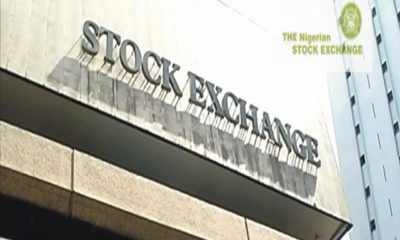- NSE All-Share Index Falls Below 30,000 as Market Hits New Low
The persistent sell-offs in bellwether stocks pushed the nation’s equities market to 20 months low as the Nigerian Stock Exchange (NSE) All-Share Index (ASI) fell below 30,000 mark to close at 29,830.70 last week.
After losing 1.2 per cent the first week of 2019, the market declined further in the second week, going down by 2.6 per cent following weak sentiments among investors. The political tension has continued to keep investors away as they wait for the outcome of the general elections coming up in February and March.
The market hit a new low last seen in May 2017, on January 9, before a rebound on Thursday and Friday helped it to recover some losses. Save for the rebound in the two days, the loss recorded last week would have been higher than the 2.6 per cent. The market capitalisation went down by N301.4 billion to close a N11.1 trillion.
Apart from the NSE ASI that depreciated by 2.6 per cent, other sectoral indicators also closed in the red except the NSE Industrial Goods Index that appreciated 1.0 per cent. The NSE Insurance Index was the biggest loser, down 7.0 per cent, it was followed by the NSE Oil & Gas Index with 6.3 per cent. The NSE Consumer Goods Index dipped by 3.6 per cent decline. The NSE Banking Index closed 0.9 per cent lower.
Despite the bearish performance, some positive news hit the market last week. For instance, ABRAAJ, managers of the Aureos Africa Fund, said they would convert the $10 million loan stock in C & I Leasing Plc to equity. The $10 million was an unsecured, redeemable, convertible loan stock that matured at the end of 2018.
Commenting, the Managing Director/CEO of C & I Leasing, Mr. Andrew Otike-Odibi said: “This development is positive for our business as it improves the capital structure of the company and helps position it favorably for additional capital raise from the market in first quarter of 2019.”
Also, last week, Chairman of Cement Company of Northern Nigeria (CCNN), Alhaji Abdul Samad Rabiu said more companies from BAU Group will be listed on the NSE. CCNN, which is a member of the BUA Group, recently had a successful merger with Kalambaina Cement Company(KCC).
And Rabiu, who is also Chairman of BUA Group said the group was in discussion with the NSE so as to list other companies from the BUA Group.
“As you know BUA Group has other companies apart from CCNN that is already listed. We are discussing with the NSE so that we can list some of the companies on the exchange as well,” he said.
Rabiu thanked the management of the NSE and stockbrokers for their support during merger of CCNN with KCC, saying the new entity is now stronger to produce more products and deliver better returns to investors.
The merger has increased CCNN’s total issued and fully paid shares from 1.257 billion shares to 13.144 billion shares.
Similarly, in a bid to improve the fortunes of MRS Oil Nigeria Plc, the company appointed Mrs. Priscilla Thorpe Apezteguia as Acting managing director(MD) following the resignation of Mr. Adnrew Gbodume.
Although no reason was given for Gbodume’s resignation, it was gathered that he has returned to the head office of MRS African Holdings, which owns 60 per cent of MRS Oil Nigeria Plc.
The petroleum market company recorded a loss N425 million for the nine months ended September 30, 2018, fuelling apprehension the company may end the financial year. The nine months results showed that revenue fell from N81.9 billion in 2017 to N76 billion in 2018. Net financing cost jumped by 484 per cent from N66 million to N386 million. It ended the period with loss after tax of N425 million as against a profit of N809 million in the corresponding period of 2017. MRS Oil Nigeria would have recorded a loss last year but for an income tax credit of N2.3 billion.
It is believed that changed in management is a strategy to rescue the firm from weak performance.
The acting MD, Apezteguia holds a Bachelors of Arts degree in International Studies and Business from University of Coventry, United Kingdom. She has over 17 years’ experience in the oil and gas sector and has held high-level positions in reputable organisations.
Market Turnover
Meanwhile, investors traded 1.265 billion shares worth N14.074 billion in 19,278 deals last week compared with 1.647 billion shares valued at N8.413 billion that exchanged hands in 14,773 deals the previous week.
However, the Financial Services Industry remained the most active, leading others with 1.072 billion shares valued at N8.795 billion traded in 12,287 deals. With this, the sector contributed 84.73 per cent and 62.49 per cent to the total equity turnover volume and value respectively.
The Conglomerates Industry followed with 83.595 million shares worth N155.485 million in 750 deals. The third place was Consumer Goods Industry with a turnover of 50.537 million shares worth N3.432 billion in 2,576 deals.
Trading in the top three equities namely, Diamond Bank Plc, FBN Holdings Plc and Custodian Investment Plc accounted for 465.000 million shares worth N 2.044 billion in 2,448 deals, contributing 36.75 per cent and 14.53 per cent to the total equity turnover volume and value respectively.
Also traded during the review week were a total of 15,288 units of Exchange Traded Products (ETPs) valued at N236,445.40 executed in four deals compared with a total of 395 units valued at N816,344.70 that was transacted in 13 deals the previous week.
A total of 17,996 units of Federal Government Bonds valued at N18.426 million were traded in 10 deals compared with a total of 7,209 units valued at N6.958 million transacted the preceding week in eight deals.
Price Gainers and Losers
The price movement chart showed that 22 equities appreciated in price last week the same number of losers the previous week, while 44 equities depreciated in price, lower than 45 of the previous week.
Julius Berger Nigeria Plc led the price gainers with 22.1 per cent, trailed by Diamond Bank Plc with 12.2 per cent. Transcorp Plc chalked up 11.2 per cent, while WAPIC Insurance Plc and Cornerstone Insurance Plc garnered 10 per cent each.
Other top price gainers included: John Holt Plc (9.0 per cent); Lafarge Africa Plc (8.4 per cent); CCNN (8.4 per cent); A.G Leventis Nigeria Plc (7.4 per cent) and FCMB Group Plc (4.9 per cent).
Conversely, NEM Insurance Plc led the price losers with 33.4 per cent, trailed by Resort Savings & Loans Plc with 26 per cent. Unity Bank Plc shed 17 per cent, just as Custodian Investment Plc and Flour Mills of Nigeria Plc shed 13.1 per cent and 11.6 per cent respectively.
Neimeth International Pharmaceuticals Plc and Seplat went down by 10.2 per cent and 10 per cent in that order. Other top price losers included: MRS Oil Nigeria Plc (9.9 per cent); Champion Breweries Plc and UPDC Real Estate (9.8 per cent apiece).


 Naira4 weeks ago
Naira4 weeks ago
 News4 weeks ago
News4 weeks ago
 Naira4 weeks ago
Naira4 weeks ago
 Travel3 weeks ago
Travel3 weeks ago
 Naira3 weeks ago
Naira3 weeks ago
 Jobs4 weeks ago
Jobs4 weeks ago
 Naira3 weeks ago
Naira3 weeks ago
 Investment4 weeks ago
Investment4 weeks ago



























